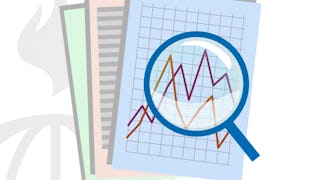Epidemiology is often described as the cornerstone science and public health and public health surveillance is a cornerstone of epidemiology. This course will help you build your technical awareness and skills for working with a variety of surveillance systems. Along the way, we'll focus on system objectives, data reporting, the core surveillance attributes, and performance assessment. This course is designed for public health practitioners and anyone who wants to learn more about the basics of public health surveillance. If you develop or implement surveillance systems or aspire to do so or use the data resulting from surveillance, then this course is for you. It's s also for people who are interested in understanding more about this fundamental epidemiologic tool and public health practice.

Enjoy unlimited growth with a year of Coursera Plus for $199 (regularly $399). Save now.

Surveillance Systems: The Building Blocks
This course is part of Epidemiology in Public Health Practice Specialization

Instructor: Emily Gurley, PhD, MPH
13,324 already enrolled
Included with
(497 reviews)
What you'll learn
Discuss the role of surveillance within the broader fields of epidemiology and public health
Assign objectives to define surveillance cases
Use public health surveillance reporting systems
Compare and contrast surveillance systems using system attributes
Skills you'll gain
Details to know

Add to your LinkedIn profile
4 assignments
See how employees at top companies are mastering in-demand skills

Build your subject-matter expertise
- Learn new concepts from industry experts
- Gain a foundational understanding of a subject or tool
- Develop job-relevant skills with hands-on projects
- Earn a shareable career certificate

There are 4 modules in this course
In the first module, we're going to review the history of public health surveillance and discuss its role in improving public health. Surveillance is one of the most basic ways that public health practitioners monitor the health and well-being of populations. Understanding how these data are used is essential. In addition to reviewing what public health surveillance is, we will discuss examples of international surveillance networks and domestic surveillance networks in the United States. Many surveillance systems are very localized, but in an increasingly connected world, the need for integrated and collaborative surveillance platforms continues to grow. By the end of this module, I hope you'll see how fundamental surveillance is to public health practice.
What's included
9 videos1 reading1 assignment1 discussion prompt
In this module, we'll discuss examples of surveillance objectives and the considerations that go into deciding what the objective should be and how this must be balanced with public health goals and available resources. Clear thinking about the objective for surveillance system will guide every decision from how to define your cases, to where to look for them, and what kinds if any of diagnostic test to use. I'll provide you with real world example of a public health surveillance system to give you the opportunity to wrangle with how to design a surveillance system based on its objectives. In this exercise, you'll learn that no surveillance system is perfect, but they can be well-suited for a specific purpose.
What's included
8 videos1 assignment1 discussion prompt
In this module, we'll discuss what happens with data that are generated from public health surveillance. Recall that public health surveillance data are collected to spur public health action and decision-making. So we'll talk about how this reporting occurs. You'll think through all the various audiences who will use data from a surveillance system. We'll present examples from international and domestic surveillance systems in the United States to give you an opportunity to identify who would expect to have a report from some specific public health surveillance systems. At the end of this module, you'll be able to describe how public health data are communicated for public health action and how important stakeholders are identified.
What's included
7 videos1 assignment1 discussion prompt
In this final module, we'll introduce you to various surveillance attributes we use to describe the performance of public health surveillance systems. While no surveillance systems is perfect, we need to be able to systematically evaluate the utility of the surveillance and compare surveillance systems. The US Centers for Disease Control and Prevention have a list of surveillance attributes which are commonly used globally, and we will review those. You will think about these attributes and performance characteristics within the context of two separate public health surveillance systems: one for an infectious disease, and one for a chronic disease.
What's included
15 videos1 assignment
Earn a career certificate
Add this credential to your LinkedIn profile, resume, or CV. Share it on social media and in your performance review.
Instructor

Offered by
Explore more from Public Health
 Status: Free Trial
Status: Free TrialJohns Hopkins University
 Status: Free Trial
Status: Free TrialUniversity of California San Diego
 Status: Preview
Status: PreviewThe University of North Carolina at Chapel Hill
 Status: Free Trial
Status: Free TrialJohns Hopkins University
Why people choose Coursera for their career




Learner reviews
497 reviews
- 5 stars
81.28%
- 4 stars
14.68%
- 3 stars
3.21%
- 2 stars
0%
- 1 star
0.80%
Showing 3 of 497
Reviewed on Aug 23, 2020
The course was great. the teacher explained the course material in a simple and understandable language
Reviewed on Jun 17, 2020
This course helped me to know about the surveillance programme, How it is conducted and also about the 9 attributes.
Reviewed on May 8, 2020
Most of the learners come from non- English speaking countries. Thanks, Emily Gurley for teaching us with an easily understandable accent.
Frequently asked questions
To access the course materials, assignments and to earn a Certificate, you will need to purchase the Certificate experience when you enroll in a course. You can try a Free Trial instead, or apply for Financial Aid. The course may offer 'Full Course, No Certificate' instead. This option lets you see all course materials, submit required assessments, and get a final grade. This also means that you will not be able to purchase a Certificate experience.
When you enroll in the course, you get access to all of the courses in the Specialization, and you earn a certificate when you complete the work. Your electronic Certificate will be added to your Accomplishments page - from there, you can print your Certificate or add it to your LinkedIn profile.
Yes. In select learning programs, you can apply for financial aid or a scholarship if you can’t afford the enrollment fee. If fin aid or scholarship is available for your learning program selection, you’ll find a link to apply on the description page.
More questions
Financial aid available,





